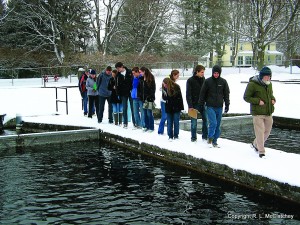In Paine 212, there are 11 students working to analyze and learn more about climate change. They are the selected members of Houghton College Science Honors.
This year’s Science Honors Program is centered around learning about climate change while collecting data to add to the compendium of research on the topic. At the same time, students also study the humanities through the lens of science.
 The course incorporates two foci of research, the primary being to design and build a radiosonde. A radiosonde is a box of sensors that records atmospheric data and sends it by radio to students on the ground. It will be attached to a weather balloon and sent into the upper atmosphere when the students launch this May.
The course incorporates two foci of research, the primary being to design and build a radiosonde. A radiosonde is a box of sensors that records atmospheric data and sends it by radio to students on the ground. It will be attached to a weather balloon and sent into the upper atmosphere when the students launch this May.
The secondary focus is researching the effect of climatic variation on fish. Using chillers, the students will alter the temperature of their aquaria to simulate forecasted climate change. They will then measure cortisol levels in the fish compared to the water temperature. This will attempt to measure the survivability of fish in the altered climatic state of the future.
Students will also record the rate of melting of the ice at local lakes over the next few weeks. “This is the beginning of a long data set that we will be trying to collect. A lot of people are doing this all over the world,” explained biology professor Dr. Wolfe, “We’ll also be taking representative shrubs and trees on campus and we’ll be measuring when they start to leaf out and flower.”
To tackle the task of building a radiosonde, the students have split into three groups. These being so named Sparkles, Maple Leaf, and The Flying Monkeys. Each has its own hypothesis it is looking to test. Team Sparkles is working to find out how the amount of UV radiation absorbed by the ozone layer affects temperature in the stratosphere. Team Maple Leaf is collecting data on how the concentration of carbon dioxide changes as altitude increases. The Flying Monkeys is researching the levels of infrared light that is absorbed by the atmosphere at each altitude.
Each group will build their own system to attach to a weather balloon. They will be programmed to record data relevant to what the students are testing and send it to them while in flight.
When they are not investigating the science of climate change, the students of Science Honors have been able to take trips relevant to their studies. Last semester, they took a trip to Canandaigua Lake to study glacial recession, took a boat cruise, and ate grape pies on the way back home. They went ice fishing on Cuba Lake earlier this semester. Right before spring break, they visited the oldest fish hatchery in the western hemisphere in Caledonia, NY.
These trips are designed to grow the students’ understanding of science and the world around them, but they also serve to unite them in a bond of camaraderie. “I will never forget the day in Science Honors on our way home from Canandaigua Lake when Dr. Wolfe bought us grape pies. We sat in the grass surrounding a Dollar General parking lot and chatted together as we ate our dessert. The adventures that we encounter on field trips: priceless!” said honors student Olivia Morse.
Another student, Ruthanna Wantz, said, “One of the most unexpected fun things about being in Science Honors has been hanging out with prospectives when they come for the interview weekends. And hearing the stories of the upperclassmen who were in Science Honors before.”
Though challenging, the students enjoy accomplishing tasks that get them closer to their goals. Said student Jordan Scott, “Science Honors has been a very enjoyable experience thus far. I have made 10 great new friends and developed relationships with three professors from different science disciplines that I never imagined I would have had when coming to college. This program has helped me further my thinking in all aspects of science and created a unique culture for learning through experience with assistance from professors and peers.”
The students have been very successful in working in a new and more flexible scientific environment. Guided by professors rather than fed knowledge, they are beginning to emulate the methods they will use when working as scientists in the future. Dr. Brandon Hoffman applauds their efforts, “It has been great to see the students getting excited about their projects. Some have charged far ahead, downloading manuals and developing systems they believe will be helpful to their project.”
The students have been recording their scientific adventures and discoveries in a blog at balloon2014.blogspot.com. They encourage all who have an interest in science to follow them as they prepare to launch their balloons during Mayterm this year.
